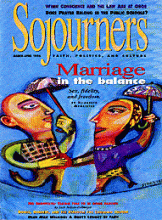ROSEMARY RADFORD Ruether's analysis of the power, particularly social power, that traditional, non-inclusive names of God have on us in our perceptions of gender and our inclination toward sexism against women is thoughtful and appreciated ("The Image of God's Goodness," January-February 1996). Nonetheless, the article raises several concerns about the influence that such revisions have on our ontological commitments, for in several passages she tacitly implies that changing the ways we refer to God entails changing our entire conception of God (as omnipotent, etc.).
For instance, in her proposed feminist re-understanding of power, Ruether remarks that "we are called into healthy self-esteem, into the power of one's own creative agency that can affirm the good potential and creative agency of others." Such a project may indeed be part of our commitment to the life-changing teaching of Jesus, but this must never overshadow the divinity and reality of God. I wholeheartedly endorse Ruether's commitment to the use of more feminine images of God in our Christian communities, so long as we can read the Apostle's Creed (or some derivation thereof) with sincerity, affirming our belief in a transcendent God.
Read the Full Article
